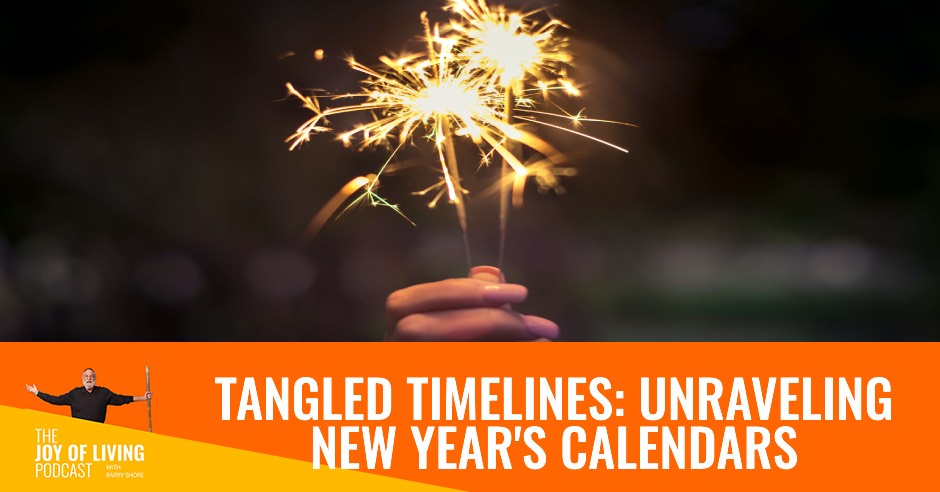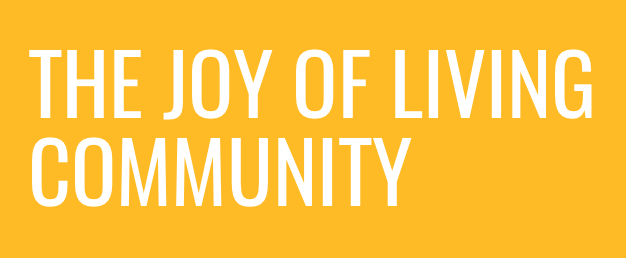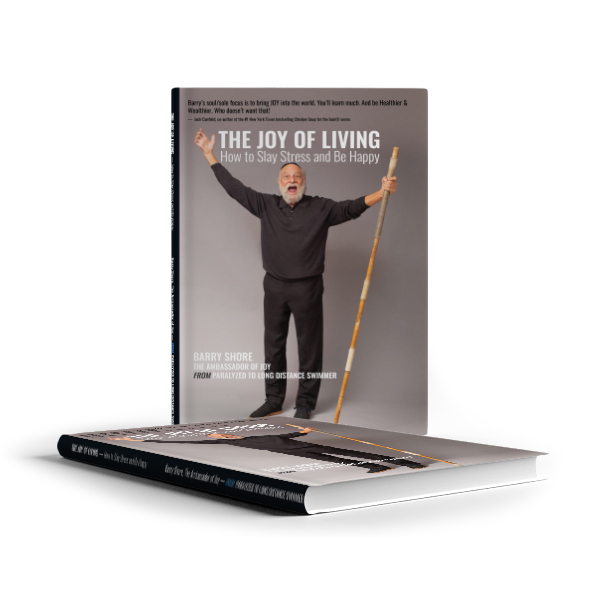Share This Episode

Tangled Timelines: Unraveling New Year’s Calendars
Join Barry Shore, the Ambassador of Joy, on a captivating journey through the fascinating history of New Year’s calendars. Uncover the intriguing evolution of timekeeping, from ancient customs to modern-day celebrations. Delve into the stories behind various New Year’s dates, revealing the diverse cultural tapestry woven across civilizations.
Explore the influences of Julius Caesar, Pope Gregory 13th, and historical figures in shaping our calendar system. From England’s delayed adoption to Russia’s unique adherence, witness the intricate complexities surrounding calendar shifts and their impact on global celebrations.
Discover surprising connections between ancient traditions and modern festivities, unraveling the origins of April Fool’s Day and the naming of months. Embrace newfound knowledge and carry three captivating calendar facts to share at your New Year’s gatherings.
Listen Here (click here to watch episode)
Show Notes:
This episode is brought to you by BetterHelp.
Give online therapy a try at betterhelp.com/JOYOFLIVING
and get on your way to being your best self.
[1.00] Introduction and Importance of Learning
- The show promises intriguing insights into New Year’s calendars.
- Emphasis on the importance of lifelong learning for a happier, healthier, and wealthier life.
- You can be encouraged to take action by visiting Barry Shore’s website for a free transformational eBook.
[4.35] Exploring New Year’s Dates and Ancient Calendars
- Challenges the idea of January 1 as the only New Year’s date.
- Mentions the appropriateness of spring or fall as New Year in various ancient calendars.
- I’d like to briefly discuss the Julian calendar’s shift and the Gregorian calendar’s introduction by Pope Gregory.
- Highlights the oddity of January 1 as the New Year compared to the vernal equinox or fall.
[7.01] Historical Insights and December 25’s Significance
- Roman Calendar and Naming Months:
- Explains the naming convention of months in the Roman calendar, where December (“Deca”) means 10 despite being the 12th month.
- Traces the evolution of the calendar, leading to the current naming system.
- December 25 and Jesus’ Birth:
- Explores the significance of December 25 in ancient celebrations like Saturnalia and its association with Jesus’ birth in Christian tradition.
- Offers an interesting perspective on Jesus’ circumcision occurring on January 1, tying into the celebration of the New Year.
[14.28] Introduction to Multiple Calendars and New Year Celebrations
- Diversity of Calendars:
- Highlights various cultural New Year celebrations like the Chinese, Hindu, Japanese, Burmese, and Muslim New Years.
- Mentions the alignment of these calendars with the vernal equinox or springtime.
- Importance of Understanding January 1:
- Challenges the idea of January 1 as the sole New Year’s date.
- Encourages listeners to delve deeper into the historical significance of January 1.
[16.08] Historical Figures and Calendar Evolution
- Julius Caesar’s Calendar Reform:
- Explains Julius Caesar’s role in recognizing the discrepancy between the civic and ceremonial calendars.
- Introduces the creation of a 12-month calendar with leap years and months named after significant figures.
- Pope Gregory’s Calendar Reform:
- Shifts the focus to Pope Gregory 13th’s involvement in reforming the calendar due to religious holidays, notably Easter.
- Discusses the introduction of leap years and the new calendar’s implementation in most of Europe but not England.
[19.56] Calendar Divergence and the Protestant Revolution
- Calendar Divergence and England’s Separation:
- Details how England, under Henry VIII’s rule, departed from the Catholic Church and refused to adopt the new Gregorian calendar in 1582.
- Touches upon the Protestant Reformation’s adherence to the new calendar despite diverging religious beliefs.
- Continued Challenges with Multiple Calendars:
- Discusses the challenges of maintaining various calendars across different regions despite attempts at standardization.
- Teases a further discussion on April 1 as New Year’s and its connection to April Fool’s Day.
[22.02] The Evolution of Calendar Adoption
- England’s Delayed Calendar Adoption:
- Discusses England’s adherence to the Julian calendar despite the rest of Europe shifting to the Gregorian calendar in 1582.
- Highlights the difficulties caused by the 11-day gap in correspondence between England and the continent.
- Shift to Gregorian Calendar in 1752:
- Details England’s decision to finally adopt the Gregorian calendar in 1752.
- Explains the adjustment of dates, such as George Washington’s birthday, due to the calendar shift.
[24.01] New Year’s Celebrations and Calendar Changes
- Evolution of New Year’s Dates:
- Explores historical New Year’s celebrations on March 25 and April 1, connecting April 1 celebrations to April Fool’s Day origins.
- Emphasizes the shift to January 1 as New Year’s Day across the UK and its colonies.
- Calendar Adoption Challenges:
- Details Russia’s adherence to the Julian calendar until 1919, post-communist revolution, emphasizing the influence of the Greek and Roman Orthodox Churches.
[26.00] Julius Caesar’s Influence and Conclusion
- Influence of Julius Caesar and Augustus:
- Explores the naming of July and August, highlighting Augustus’ decision to have a month named after him.
- Discusses the evolutionary nature of calendars over millennia.
- Encouragement to Share Knowledge:
- Urges listeners to share three newfound interesting points about calendars learned from the episode at New Year’s parties.
- Invites action by promoting Barry Shore’s eBook and encourages transformation and new perspectives for the upcoming year.
Important Links:
About Barry Shore
Barry is the man who was completely paralyzed overnight from a rare disease and built a system to enable YOU to Live in JOY, daily. Yep, that’s me. I’m also a Mental health Activist, having known deep trauma and despair. In addition I’m a successful serial entrepreneur with 2 multi million dollar exits, 3 issued US Patents, and a vision for enabling people to donate money at no cost. Yes, You’re reading right. Lest I forget, I’m a best selling author. A successful podcaster with more than 3 million.
[bctt tweet=”Teases a further discussion on April 1 as New Year’s and its connection to April Fool’s Day.” username=”ambassador4joy”]
THIS SHOW BROUGHT TO YOU BY ORGANIFI
use code LIVING for 20% off your next order


